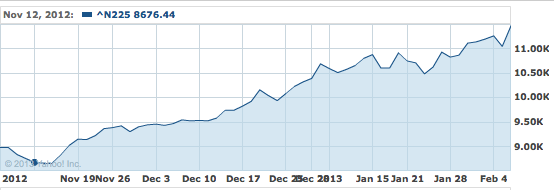A few years ago I started to push the view that most economists had misinterpreted the Japanese liquidity trap. The BOJ had not tried valiantly to inflate, and failed. Japan was not “stuck” in any sort of trap. The low interest rates and bloated base did not mean easy money. I often point out that the BOJ tightened twice (2000 and 2006) when there was no inflation, which made mild deflation almost inevitable. At one time I got into a bit of a debate with Paul Krugman:
Hmm. I see that Scott Sumner has a post heatedly attacking the idea that Japan is stuck in a deflationary trap; he insists that Japan has deflation because that’s what the Bank of Japan prefers:
“I was under the impression that the Bank of Japan was an ultra-conservative bank, and liked mild deflation. Indeed I thought that was pretty widely understood. I guess not.”
He guesses right: that’s not at all the view of those who have been following Japanese monetary policy since the 1990s, and have even talked to BOJ people now and then. I’m sorry to say that the fact is that Japan is in a deflationary trap. You can argue that the BOJ should have done more — and I would. But persistent deflation isn’t a target, it’s what has happened because conventional monetary policy has lost traction and the BOJ isn’t willing to be more adventurous.
Here’s Paul Krugman yesterday:
What you need in this situation is a negative real interest rate — which means that you need some expected inflation, because nominal rates face the zero lower bound.
But Japanese policy has never sought to achieve this. Deficit spending has put part, but only part, of the excess desired private saving to work; this has mitigated the slump, but not produced a booming economy, except perhaps briefly circa 2007. And the Bank of Japan has always pulled back on monetary policy when the economy looks better, instead of doing what it should, which is to keep the pedal to the metal until the inflation rate is solidly into positive territory.
I don’t think his position has technically shifted, as a close look at the earlier post tells a similar story to the recent post. But I do think there’s a sort of change in emphasis. Earlier he was skeptical of the ability of the BOJ to get Japan out of a deflationary trap. Now he’s (correctly) pointing out that all this talk of stimulus is boosting the expected rate of inflation in Japan. They are not “stuck.” So I see the “pedal to the metal until the inflation rate is solidly into positive territory” as emphasizing that effort matters, it isn’t all about managing expectations. And that wording seems slightly closer to the monetarist perspective on Japan. Again, these are slight differences of nuance so I don’t want to make too much of it. He might argue that “pedal to the metal” resolve was a way of managing expectations.
It’s harder than most people assume to pin down the difference between new Keynesianism and market monetarism. Perhaps we are simply more confident that the BOJ can succeed if it tries.
Here’s one way of putting it. Krugman and I both agree that the failure to put the pedal to the metal was a sufficient reason for deflation to persist. I also view it as a necessary condition, whereas Krugman tends to be a bit circumspect about how big the “expectations trap” hurdle would be if the BOJ became determined to inflate.
Pico Iyer? Krugman’s post reminded me of a recent article in the NYR of Books, entitled “Masters of Doing Nothing at All.” Here’s the opening sentence:
Japanese literature is often about nothing happening, because Japanese life is, too.
PS. In case I have any Japanese readers, here’s what I posted on November 15, 2012:
Each day I check out the major stock markets. This morning I saw that Hong Kong and Singapore were down over 1%. Britain, Germany and France were also down. But the Japanese market, which tends to move with the other Asian markets, was up by 1.90%. That’s a surprisingly large divergence. Is there any news? It turns out that there is news, but only if you don’t believe in “liquidity traps.” Travis Allison sent me the following:
“The yen slumped to the lowest in more than six months against the dollar on prospects Japanese elections next month will hand power to an opposition party that advocates more aggressive monetary easing.”
And here’s a graph of the Nikkei since that date, up 32.3% in less then 3 months:
Don’t say I didn’t tell you! Beats the rate of return on that account at the Postal Savings Bank. ![]()
PPS. Paul Krugman jumped on board the Abe bandwagon on January 11, when they announced a fiscal stimulus proposal. By then the stock market was already up sharply, mostly on persistent rumors of a 2% inflation target for the BOJ. But I’ve been talking about this issue from day one of the Great Nikkei Bull Market.
PPPS. Not much help to investors in America, as the yen has fallen sharply. But the Japanese CPI has barely budged, so it’s a pretty big real increase in Japan.
PPPPS. The smiley face is because as much as I’d like to take credit for a lucky call, I still believe in the EMH.
HT: Saturos
